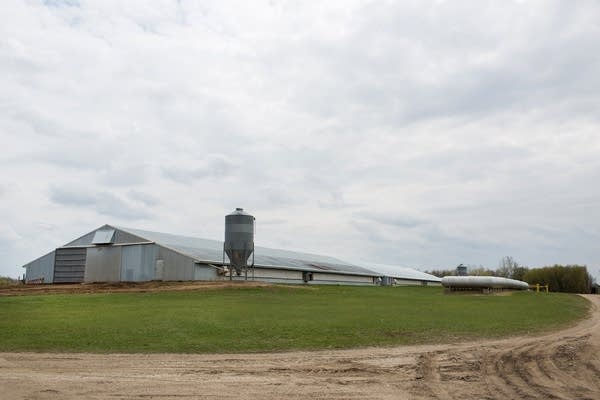Bird flu has mixed impact on Minnesota poultry producers

Since early March, more than 9 million birds on 108 poultry farms in Minnesota have been killed as a result of the H5N2 avian flu outbreak. Most of those farms are still temporarily shut down for cleanup, and processing plants have had fewer birds coming through.
As bad as avian flu has been for some, the Minnesota companies that depend on poultry production report varying impacts on their bottom lines. The extent of each company's losses may come down to whether they produce turkeys, chickens or eggs.
Dale Lauer, a veterinarian with the Minnesota Board of Animal Health, said certain poultry producers in the state have been hit hardest.
"Obviously here in Minnesota, we've identified the majority in turkey flocks," Lauer said. "I know that from other states large layer complexes have been affected, and it's been pretty devastating."
Create a More Connected Minnesota
MPR News is your trusted resource for the news you need. With your support, MPR News brings accessible, courageous journalism and authentic conversation to everyone - free of paywalls and barriers. Your gift makes a difference.
Turkey producer Jennie-O, which is owned by Austin, Minn.-based Hormel, temporarily laid off 233 employees at its Faribault plant. The company has also cut back production days at plants in Melrose and Willmar.
Jennie-O president Gary Leitch told investors Thursday that the company expects sales to dip 15 percent and production to fall about 20 percent in the second half of 2015, when compared to the second half of 2014.
The story is a bit different for operations that raise chickens in Minnesota. Only five chicken barns in the state have been hit by the avian flu, and four of those have been egg-layer barns.
Lauer said that egg-layer barns are prone to loss because the large flocks are raised close together, so disease travels fast.
"If one barn is positive all barns are positive," he said. "And all the poultry on that site then is depopulated. So that's a very significant issue for producers."
The bird flu has left its mark on Rembrandt Enterprises' egg-laying facilities in Renville, Minn., and Iowa. Two million chickens in the Renville location, just two hours west of the Twin Cities, died in the outbreak.
"I think we've lost, between different locations, about 8.5 million, but we still have over 5 million birds left," said Glen Taylor, the Mankato businessman and Minnesota Timberwolves owner who also ownes Rembrandt. "So we're trying to keep our employees, as many as we can, employed through these other jobs, but we've had to lay off some."

The company has temporarily laid off 39 workers at the Renville facility.
In St. Cloud, chicken producer GNP Company, known for its Gold'n Plump and Just Bare brands, has so far not been affected.
"Fortunately we have had no confirmed cases of highly pathogenic avian influenza in our facilities at all," said company spokesperson Lexann Reischl. GNP works with 175 Minnesota farms, she said.
The company so far hasn't had to change its pricing or production because of the outbreak, but added that some new biosecurity measures have led to higher costs.
University of Minnesota Extension economic researcher Brigid Tuck estimates the financial toll on the state's poultry and related industries could total around $430 million in losses.
Tuck's model predicts that nearly 1,200 jobs in the state will be affected, with about $81 million in lost labor income.
Gold'n Plump has had to put on hold plans to build new chicken barns near flu-affected areas.
As of last week, Pam Loehr of Spring Hill, Minn., was still waiting for a 50,000-chicken Gold'n Plump barn to be completed on her property.

Eventually she'll have to pay Gold'n Plump for the barn — where she and her family will raise chickens exclusively for the company — and Loehr wonders if avian flu continues, whether she'll see the income she anticipated.
"It's just kind of nerve-wracking, because we're responsible for that financial aspect and it's been put on hold," she said. "Did we make the right decision to do it or did we not?"
With no new cases reported in a week, some in the industry are breathing easier. Steve Olson, executive director of the Minnesota Turkey Growers Association, thinks that gives farmers reason to hope.
"There's definitely a sense of hope," he said. "We've got some farms that are ready or have started to restock and repopulate, so that is positive."
With renewed hope, though, the Minnesota poultry industry shouldn't stop worrying, Olson said. Scientists think the H5N2 virus might have spread to domestic flocks from wild birds migrating through the Midwest this spring. Olson worries the virus may return in the fall, when those birds head south.